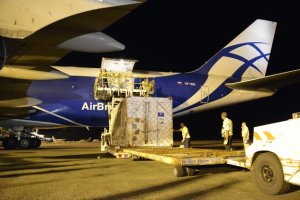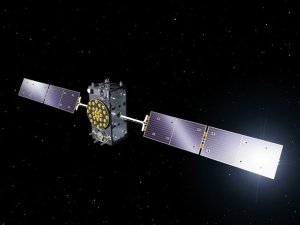Europe’s two latest Galileo navigation satellites touched down on 7-May at Europe’s Spaceport in French Guiana, ready for their joint launch this summer.
Packed safely within protective and environmentally controlled containers, the satellites were carried across the Atlantic aboard a Boeing 747 cargo carrier.
Manufactured by OHB in Bremen, Germany, with navigation payloads contributed by Surrey Satellite Technology Ltd in Guildford, UK, these satellites (the first of 22 full-capability models) had spent several months at ESTEC, where they underwent exhaustive testing in simulated space conditions.
On 5-May they left on a pair of lorries for Frankfurt Airport in Germany, from where they flew the following evening. The satellites landed at Félix Eboué Airport in at Cayenne (French Guiana) around 02:00 local time.
The satellites were then driven to the cleanroom surroundings of the spaceport, where they could be safely unpacked to begin the launch campaign.
The pair will be launched together in summer 2014 aboard a Soyuz rocket, joining the four Galileos already in orbit. This initial quartet (the minimum number needed for achieving a position fix) has demonstrated the overall system works as planned, while also serving as the operational nucleus of the coming full constellation.
Giuliano Gatti, Head of ESA’s Galileo Space Segment Procurement Office states that “similar arrival scenes should become familiar over the next couple of years. These first two Full Operational Capability satellites are effectively preparing the way for the rest of the constellation, allowing the final validation of assembly, testing and launch preparation procedures. A steady stream of satellites is foreseen, coming from OHB to ESTEC for acceptance testing and then on to French Guiana. Thanks to the preparatory work done with these pioneer satellites, future Galileos will be processed more rapidly.”
The definition, development and in-orbit validation phases of the Galileo programme were carried out by ESA and co-funded by ESA and the EU.
The Full Operational Capability phase is managed and fully funded by the European Commission. The Commission and ESA have signed a delegation agreement by which ESA acts as design and procurement agent on behalf of the Commission.


